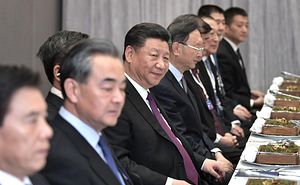As the Group of Twenty (G-20) annual summit opens this year in Buenos Aires, one meeting above all others is being anticipated.
The American and Chinese presidents are expected to sit down together. The outcome of their discussion will have a significant impact on what the assembled leaders are in Argentina to talk about in the first place: the global economy.
It is worth taking a closer look at the position in which Chinese leader Xi Jinping finds himself, five months into the U.S.-China trade war.
First and foremost, Xi wants to appear unfazed on the world stage. He wants the effects of the trade war on the Chinese economy to be perceived as a slight breeze rather than as a Force 7 typhoon, which is about where things are right now.
Second, Xi needs a domestic win. With the press in his pocket in China, there is no risk of anything but glowing news on the home front. Chinese, however, are accustomed to having to read and interpret the empty spaces in their media in order to get the whole picture. They are skilled at it, too, as evidenced by the jokes and satirical remarks aimed at Xi and the leadership that can be found by the millions on social media (thus the government’s never-ending and somewhat futile efforts to control that media).
Third, Xi really needs to convince U.S. President Donald Trump not to place additional tariffs covering the second half of Chinese exports to the United States. Trump has warned he will do just that if no progress is made as a result of the tariffs already levied. Xi knows that if the entirety of exports to the United States are hit with tariffs, the typhoon will have just reached Force 10.
In order to deliver that result, however, Xi will have to make actual, tangible concessions. And that will be a loss of face.
Ultimately, Xi’s problem is that he has to decide which road delivers the least loss of face, because all roads deliver some. As things stand, Xi either has to lose face abroad, or he has to lose face at home.
For Xi, there is no contest. He doesn’t dare risk losing face at home, because people are nipping at his heels. He has angered and threatened too many special interests, especially those that are paying for his projects, to be in a position to ignore them.
It must be remembered that Xi Jinping has gone on a spending spree. Infrastructure projects abroad, military equipment at home, outright “no strings “ aid to Africa. This spending underpins a larger geopolitical objective of Xi’s: to position China as a viable alternative to the United States, an audacious and unprecedented move.
Therefore, Xi’s wisest option is to lose a little face overseas, and spin it at home. There are all sorts of ways that he can manage the storyline – compassion for the Chinese worker comes to mind – and offer concessions such as greater market access for American goods and services, and a fair legal playing field for the protection of intellectual property rights in China (as well as actual protection of IP rights in the first place).
It is likely that Xi, like so many leaders before him, believes himself to hold a more secure position than he actually does.
China’s leadership touts that the country can soak up whatever impact the trade war has through its now burgeoning domestic economy. But many of the products that China sells to the United States are specific to American markets.
David Yanofsky at Quartz has done an excellent job of charting out the key statistics and descriptions of what the United States imported from China in 2017. The largest category of goods that the United States buys from China is in the broadly called “Electrical Machinery & Equipment” category. It represented $147 billion of Chinese exports to the U.S. in 2017, or just over 29 percent of the $505 billion in goods that America imported from China in that year
A more detailed look reveals that nearly half of this category, almost $72 billion, is telephones and telephone equipment. Since the category largely includes mobile phones, it stands to reason that those phones would not be bought by Chinese consumers. Why? Because the United States and China largely run on two different wireless protocols. The United States chose its homegrown CDMA, while China chose GSM, the European standard.
More broadly, different lifestyles among ordinary Chinese and Americans make it unrealistic for Chinese exporters to market their products at home. Not too many Chinese will be purchasing outdoor furniture, grills, or much of anything for the home garden. A majority – especially of the middle class — live in apartments and condominiums in cities. In another major category of American purchases from China, furniture and bedding, one finds that the furniture exported to America and that sold in China represent two completely different design aesthetics.
Trump’s problems are less severe. As he tries to level the playing field, and to protect American workers, their jobs, and American technology, then his base will continue to support him. Workers being laid off at the General Motors factory in Ohio echoed this sentiment earlier this week, as the New York Times reported:
While critics faulted the president for failing to deliver what he promised, a number of workers were quick to exonerate him.
Some portrayed him as well intentioned but simply outgunned by larger economic forces. Others suggested that whatever Mr. Trump’s flaws, they paled in comparison to those of General Motors, which they considered the real culprit.
Ultimately, though, the reality of each leader’s situation matters less than his perception of that situation – and that we cannot know. And so all eyes will be on the two leaders on Saturday.































